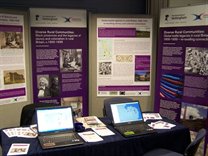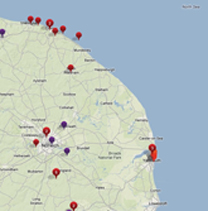Project Overview
The project aims to enhance understandings of the histories and legacies of slavery and colonialism beyond metropolitan and port cities, and how these are being used today in heritage work with communities in rural and provincial Britain.
Project activities:
1. Review of literature
Encompassing a range of Arts and Humanities perspectives, the project is conducting a review of work on Black presences and the histories of slavery and colonialism in rural Britain from c.1600-1939 through a lens of social connectivity and community. Attending to current heritage and memorialisation initiatives, which typically reference ideas of community and social cohesion, the project also considers the representation of such histories to diverse publics.
2. Consultation and Development Workshops
The first consultation workshop explored the potential for framing the project's literature review around the idea of particular rural heritage sites, e.g. country houses, textile mills and churches. More broadly it reflected on both the potential and the difficulties of engaging wider publics with the histories and legacies of slavery and colonialism as connected with rural Britain. Designed in dialogue with our project partner and community engagement facilitator, Cliff Pereira, the two public development workshops allowed us to further test the potential for focusing on such sites as a framework for exploring slavery and other colonial connections embedded in the UK's countryside. (See Public Engagement section for further information.) A final consultation workshop is planned for October 2013.
3. Archival Scoping & Mapping
The project team are scoping archival, material and performative sources on rural histories and legacies of slavery and colonialism, focusing especially on the East Midlands and East Anglia, which have received relatively little critical attention to date. In relation to this scoping work, Susanne Seymour developed a new mapping resource that visualises some of these connections. (See Open Educational Resources section below.)
Public Engagement
The final element of this project is public outreach work. Country estates and rural textiles have been the focus of reflective workshops, with further engagement planned in the East Midlands.
Public development workshops:
1. Rural Community Histories: Legacies of slavery & colonialism and the country house
28th July 2012, Rufford Abbey, Nottinghamshire
Organised around a series of presentations by Seymour and Jones, and related group activities facilitated by Pereira, this workshop explored the often hidden legacies of slavery and colonialism that can be traced through country houses. Referring in particular to properties in the East Midlands and the East of England, it touched on examples of colonial and slavery connections that can be drawn out of both published and archival materials such as family trees and estate accounts, as well as photographs and paintings of Black visitors and servants. It also considered the fabric of the estate, its house and its furnishings. Additionally, the workshop sought the participants' views on country houses as heritage sites, prompting lively discussions on how such properties could acknowledge the potentially 'difficult' histories of colonialism and slavery in their interpretative materials.
2. Global community heritage: Slavery, colonialism and the textile industry in rural Britain
9th August 2012, New Art Exchange, Nottingham
Organised around a series of presentations by Seymour and Jones, and related group activities facilitated by Pereira, this workshop explored the often hidden legacies of slavery and colonialism associated with the rural textile industry. Drawing on local and regional examples, such as Cromford Mill in the Derwent Valley, the workshop examined the more or less visible connections to histories of slavery and colonialism, including the various global links created through the use of raw materials in the textile industry and the production of textile goods for slave trading or for plantation supplies. Reflecting on potential parallels between textile workers in rural Britain and plantation workers in colonial Americas, workshop participants also touched on the parallels between practices and experiences of indentured and enslaved labour, though the important caution to avoid approaches which may inadvertently 'equalise' slavery and indenture was also voiced.
The day's presentations and activities encouraged considerable discussion, with participants drawing on a variety of different perspectives: some reflected on family histories of working in the textile industry; others brought expertise from local history societies; yet others brought experience from working in the museum and heritage sector.
AHRC showcases:
Susanne Seymour was awarded an additional AHRC research development grant for the creation of further public engagement resources, which were then exhibited at two AHRC Connected Communities showcase events in 2013. The materials included: banners and posters exploring the legacies of slavery and colonialism traced through country estates and rural textile areas; an interactive mapping resource and supporting leaflets.

Showcase stand. Photograph by Richard A. Gaunt
Open Educational Resources
A new interactive mapping resource (using Maptive freeware) has been developed as part of the project's archival scoping activities. It maps materials on the historical legacies of slavery and colonialism and Black presences in rural parts of the east of England (Norfolk and Nottinghamshire) and the east of Scotland (Angus), where such histories have been relatively neglected.

Mapping Resource
Using the mapping resource:
The mapping includes categories of abolitionists; Black presences; colonial service; plantation or slave ownership; slave trade; and slave-based goods trade. You can view all connections or those for the individual categories. Zoom in for greater geographical detail and click on the markers for further information on the connection and its source.
Adding to the mapping resource:
This resource is designed to be developed over time as new materials become available. We would particularly welcome source material on the three rural counties highlighted but any rural-based information is welcome. If you wish to contribute material to the map please email Dr Susanne Seymour, the project leader: susanne.seymour@nottingham.ac.uk


The project is funded by the Arts and Humanities Research Council under its Connected Communities programme.
The Arts and Humanities Research Council (AHRC) funds world-class, independent researchers in a wide range of subjects: ancient history, modern dance, archaeology, digital content, philosophy, English literature, design, the creative and performing arts, and much more. This financial year the AHRC will spend approximately £98m to fund research and postgraduate training in collaboration with a number of partners. The quality and range of research supported by this investment of public funds not only provides social and cultural benefits but also contributes to the economic success of the UK. For further information on the AHRC, please go to: www.ahrc.ac.uk
Project Team
- Susanne Seymour (PI)
- Lowri Jones (Research Fellow)
- Clifford J. Pereira (Community workshop facilitator)
Advisory Group
The project’s advisory group includes a range of academic, government agency, NGO and public expertise.
- Celeste-Marie Bernier, Professor of American & Canadian Studies, University of Nottingham.
- Caroline Bressey, Director of the Equiano Centre, University College London.
- David Callaghan, PhD student, University of Birmingham, and former Heritage Officer for SCAWDI.
- Madge Dresser, Associate Professor of History, University of the West of England.
- Andrew Hann, Properties Historians' Team Leader, English Heritage.
- Linda Hardy, Parks Development Officer, Nottinghamshire County Council.
- Skinder Hundal, Chief Executive of New Art Exchange, Nottingham.
- Dorothy Johnston, Chair of the East Midlands Regional Archive Council.
- Clifford J. Pereira, Hon. Research Assistant, Royal Holloway University of London, and independent consultant.
- Alan Rice, Professor in English and American Studies, University of Central Lancashire.
- Heather Smith, Equality Specialist, The National Trust.
Project Reports
 Consultation Workshop 1
Consultation Workshop 1
 Development Workshops
Development Workshops
In the press
Susanne Seymour has given two media interviews to BBC Radio Nottingham, on Reya El-Salahi's Sunday show, which is broadcast for Nottingham's African and Caribbean community. The first interview was given on 29th July 2012, the second interview on 19th January 2014.